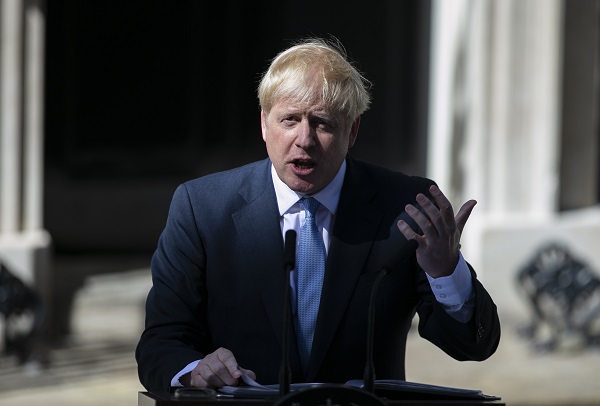London, UK’s new Prime Minister Boris Johnson convened his first Cabinet meeting in Downing Street on Thursday, kicking off his political agenda with a government freshly stocked with more ardent pro-Brexit Ministers.
Johnson, 55, told his reshuffled frontbenchers that Brexit would go ahead on October 31 “no ifs no buts”, adding that work to start governing the country would, however, begin immediately.
He takes up residence at Downing Street after two-thirds of the roughly 160,000 Conservative Party members voted for him to lead the party, taking over from Theresa May, who left the post due to her inability to command a parliamentary majority in her quest to pass the Brexit withdrawal bill, her flagship policy.
Although some of May’s Ministers held onto their jobs, and others took on new titles, Johnson took care to curate his Cabinet in line with his harsher stance on the UK’s withdrawal from the EU, Efe news reported.
Former banker Sajid Javid moved from the Home Office to become Chancellor of the Exchequer, taking over from Phillip Hammond, who opted to resign rather than serve under Johnson.
Dominic Raab, a former Brexit Secretary appointed by May who went on to resign in opposition to the withdrawal deal, becomes Foreign Secretary, taking over as the country’s top diplomat from Jeremy Hunt, the final contender against Johnson in the leadership race.
Priti Patel, one of the key figures in Vote Leave who was fired by May for holding undisclosed meetings with Israeli officials, takes on the role of Home Secretary.
Gavin Williamson, who was also fired by May for leaking information regarding the government’s position on Chinese firm Huawei’s plan to roll out 5G, is the new Education Secretary.
Liam Fox was sacked as International Trade Secretary to be replaced by Liz Truss. Former Environment Secretary Michael Gove is now the Chancellor of Duchy of Lancaster, a Ministerial post without a portfolio.
Notably, Dominic Cummings, a campaign director for Vote Leave often credited coming up with the slogan “let’s take back control” which was famously painted on the side of a red bus erroneously suggesting the UK spent 350 million pounds a week to be a member of the EU, became Johnson’s senior policy advisor.
UK authorities investigated Vote Leave for suspicious donations.
Johnson’s first challenge will be to outline a concrete plan for Brexit.
He resigned as Foreign Secretary in 2018 in disagreement with May’s deal, particularly a clause known as the Irish backstop.
The backstop was a kind of insurance policy designed to keep Britain aligned to the customs union until a solution was found for the border between Northern Ireland, a UK territory, and the Republic of Ireland, an EU member state.
The EU as insisted there can be no tweaks to the withdrawal agreement.









